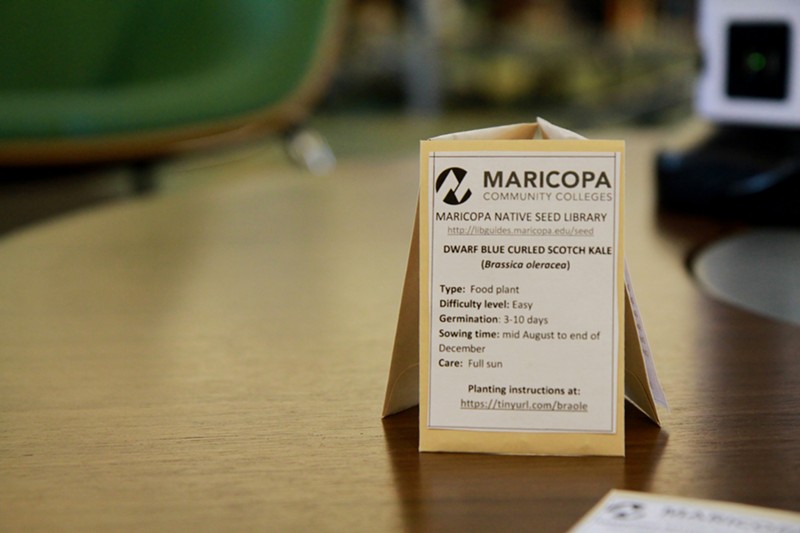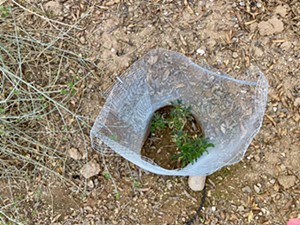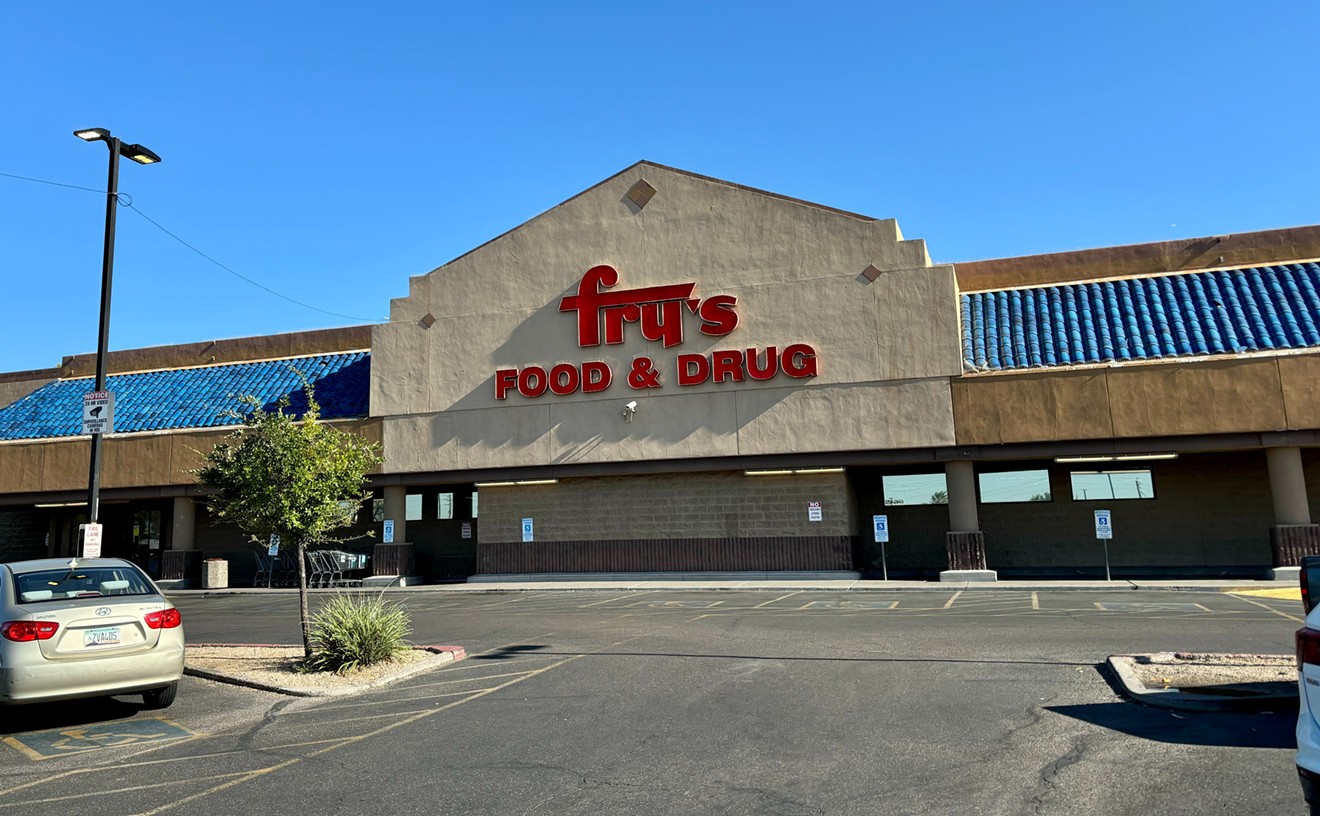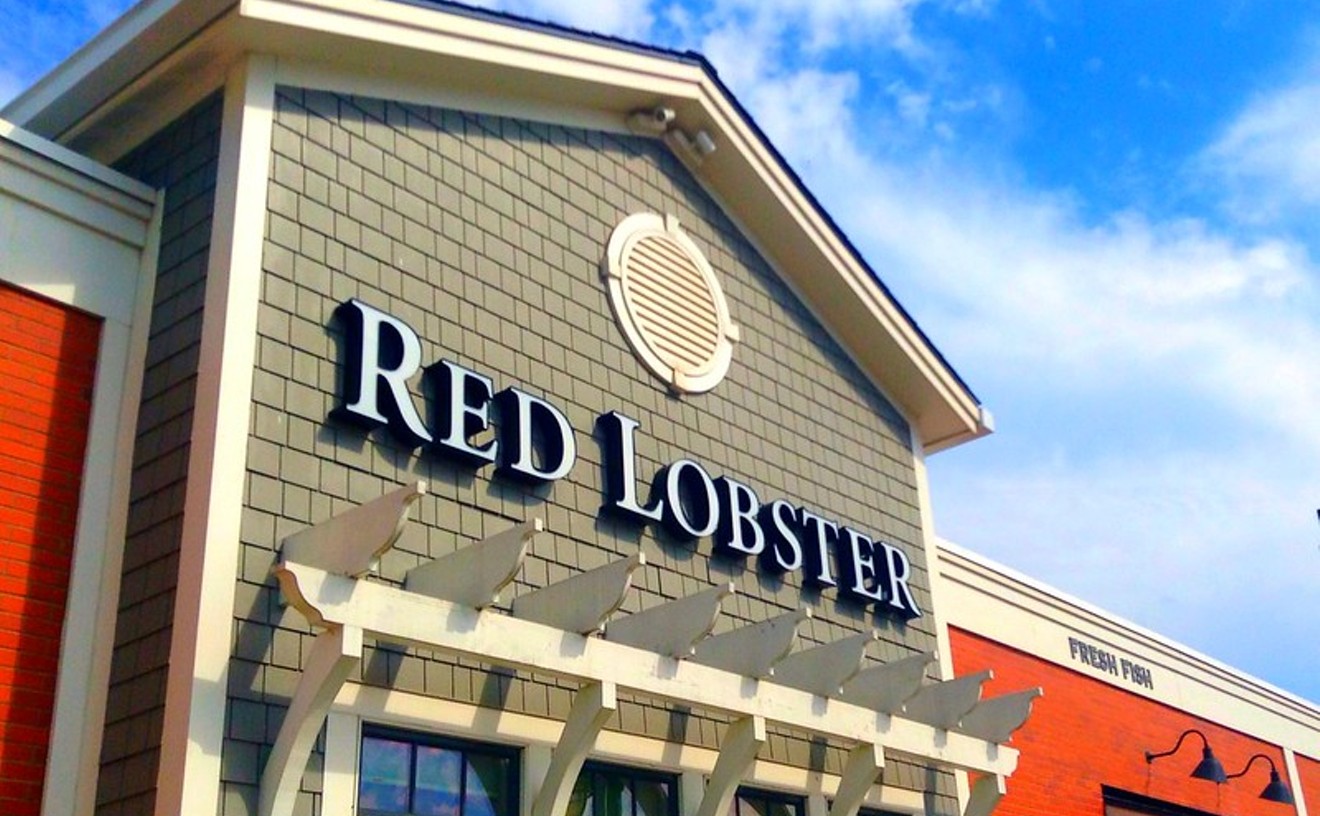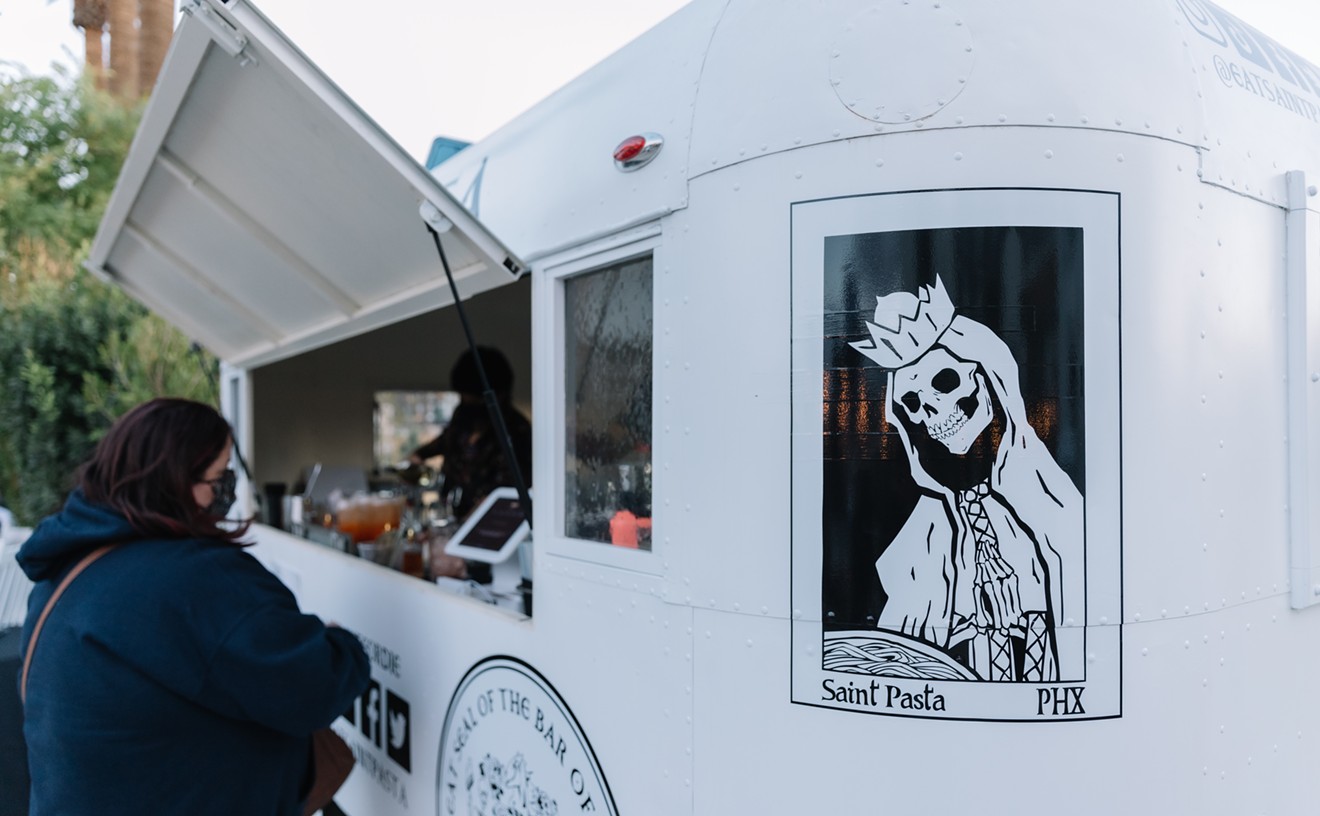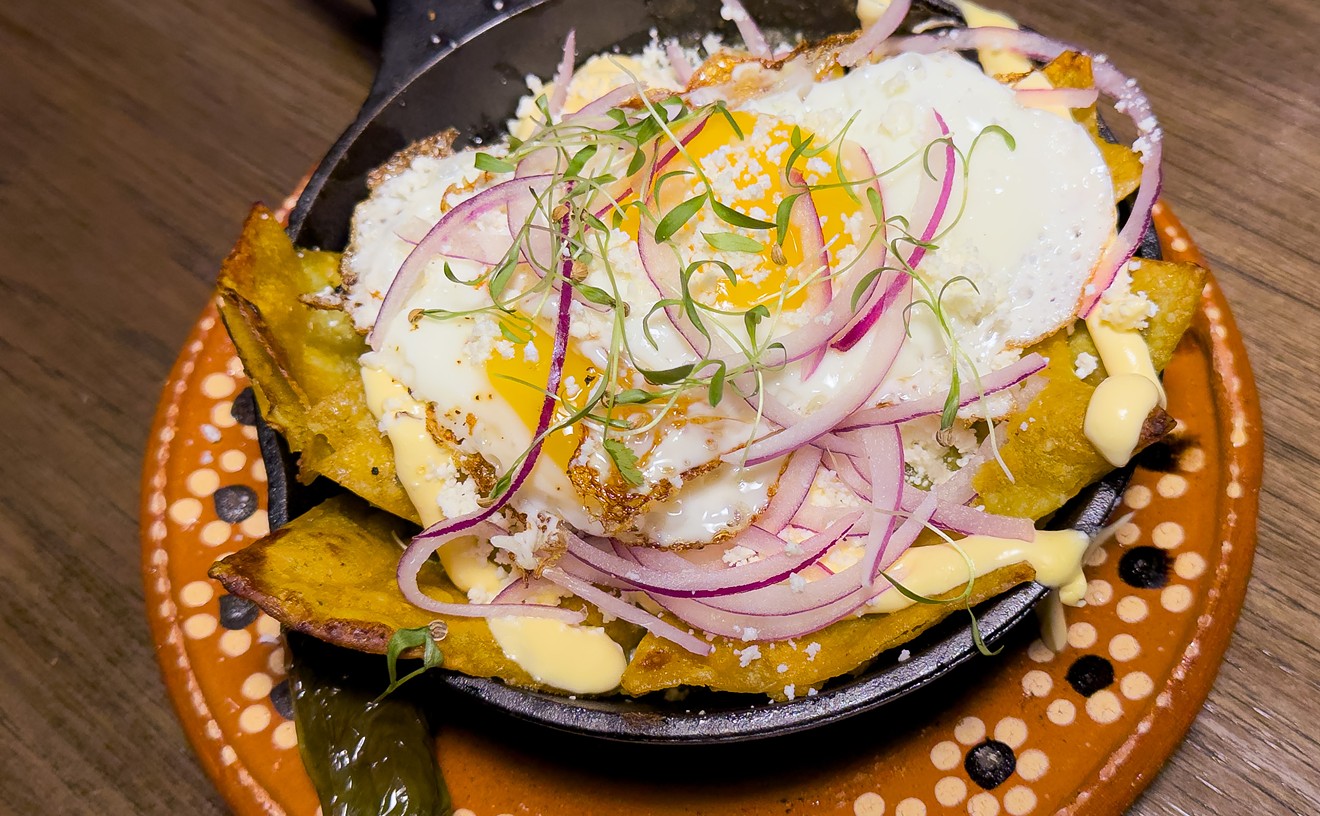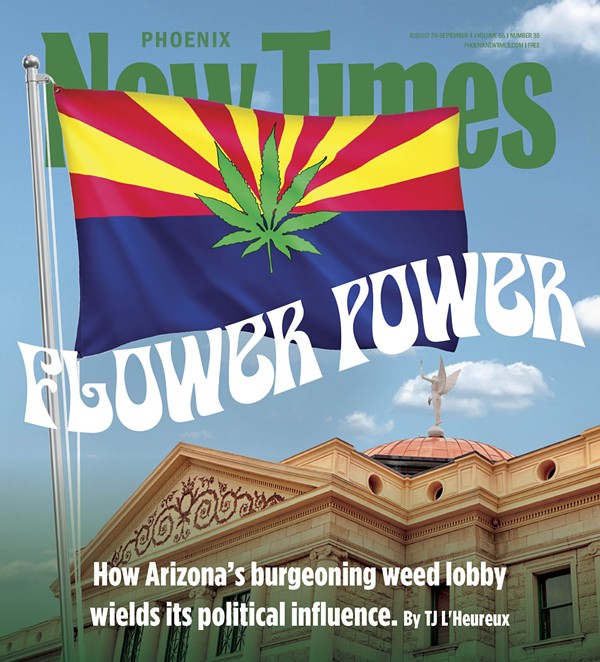But when SCC shut down due to COVID in the spring, she had to let go of that plan. Students weren’t on campus. So she instead expanded the other part of the project: the free Maricopa Native Seed Library. Now, Carlock is addressing food insecurity for the whole Valley … sort of.
“My main focus in the seed library is supporting pollinators,” Carlock says, decked out in outdoor gear, speaking near a small, fenced plant at Mesa Community College's Red Mountain campus. "If we don’t support the pollinators by conserving the plants that they use, we are not going to have anything to eat.”

Danielle Carlock pointing out new plants at Mesa Community College's Red Mountain campus.
Lauren Cusimano
These native seeds are free to Maricopa Community Colleges' students and faculty, as well as the public, via the library she founded. They come in packets of 20 to 25 (and no, you don’t have to return them after three weeks) at a few locations.
Gateway Community College’s seed library has been open since August but is only available to GWCC students and staff. Carlock has also been present at farmers’ markets like Old Town Scottsdale, Carefree, Chandler, and Sun City to hand out packets. And, along with a few volunteers, Carlock has been mailing packets for $1 just to cover postage.
So far, food plants like kale, lettuce, and bean varieties have been pretty popular at GWCC (with Firecracker penstemon being by far the most popular desert landscaping plant). Other food seeds include Sonoran Winter Wheat, Salt River Pima Pea, and Desert Chia. Participants are also supported after pickup; Carlock says there’s some basic information about the plant on the packets, including whether it’s easy, medium, or difficult to germinate, and a tiny URL directing gardeners back to the plant’s profile page on the seed library website.
As of early December, anyone can take home up to three packets from the Fannin Library at Phoenix College and the Mesa Community College Red Mountain Library. MCC Red Mountain also offers curbside pickup. There's also, at Red Mountain, an ethnobotanical garden recently established thanks to an Arizona Lottery Gives Back grant awarded via the Maricopa Community Colleges Foundation.
Ethnobotanical?
“It means pretty much any human use of a plant,” Carlock says. “Almost every plant that's here in the Sonoran Desert was used by various people groups and still used for all these different purposes.”
Carlock pulls out a one-sheet guide to the little fenced plants found throughout the small Red Mountain campus. The side oats gamma has food and fiber uses with the Apache, Kiowa, and Tewa people. The wolfberry, a shrub producing tart little berries, was food to the Yuma, Akimel O'odham, Tohono O’odham, and Piipaash people (and hikers, too). The Adonis blazing star (which Carlock really had to hunt down) has food, medicinal, and ceremonial uses with the Keres people and Dine (Navajo).

MCC’s Red Mountain campus has now become something of a showroom for the seed library.
Lauren Cusimano
“These are one of the few perennial mustards in the Sonoran Desert and they support butterflies, so I'm kind of crazy about those because they're not that common in the desert. I've only seen them a few times,” she says. “I want everyone to have this mustard in their yard; that's my dream.”
It’s clear Carlock thinks about other people’s yards and patios and balconies a lot. There's a good reason for that: Compared to the natural environment, residential areas are safer from wildfires and have reliable water sources.
“While we figure out how we're really going to address climate change, the more that we have these plants in our landscapes, it’ll be a plan to keep them and conserve them in the meantime,” she says. “Maybe someday these could be a source of seeds to take back to the burned areas.”
Personally, Carlock has planted more than 150 plant species in the past 10 years at her home, attracting birds, bees, and more. She says it brings her joy, especially during the pandemic. “It's about distributing seed, it's about education, but it's also about inspiring people to bring wildlife to their own landscapes,” she says. “Even five or 10 plants added over time makes a huge difference.”
The plants at MCC Red Mountain are in infancy, just planted in October. But Carlock still has more to do as they grow and before her sabbatical ends in August 2021 (when she returns to SCC as a full-time librarian). In January or February, she wants to hold workshops about growing food plants in pots since she assumes a lot of students are in apartments. She wants to possibly employ student workers. And further out into the future, she wants to offer the five to 10 plants most valuable to wildlife as plants, not just seeds, at the big SCC plant sale.
But aside from all this, and the dream of a mustard plant in every yard, Carlock still has even bigger plans. She wants to distribute seeds and native plants along a corridor, building a pollinator pathway from the Superstition Mountains in the east Valley to the White Tank Mountains in the west Valley — crossing the entire Phoenix area.
“Imagine linking every one one of the colleges, and then parks, and filling it in with households landscapes,” she says. “That’s kind of a dream I have.”
For more information and a list of available food plant seeds, see the Maricopa Native Seed Library website. Or contact [email protected]. Or follow the Maricopa Native Seed Library Instagram or the hashtag #seedsuccesses.

